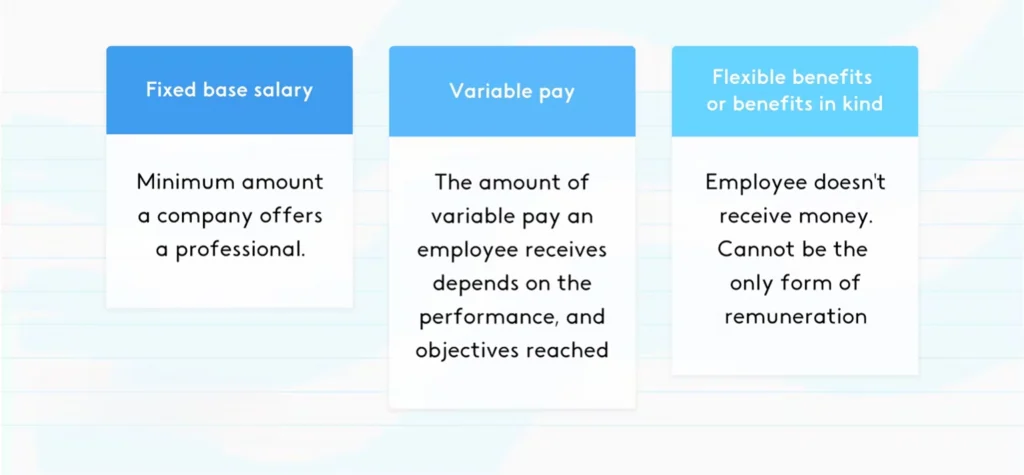
Salary pay is a key concept in the professional world, serving as the primary method of compensation for many employees across various industries. A salary is a predetermined, fixed amount of money that an employer agrees to pay an employee for their work, typically expressed as an annual sum. This amount is usually divided into regular payments made monthly or bi-weekly, ensuring financial consistency and stability. Unlike hourly wages, which fluctuate based on hours worked, a salary provides predictability and reflects a broader set of responsibilities, often encompassing work that may extend beyond standard working hours.
The Structure and Benefits of Salary Pay

The structure of salary pay offers several distinct advantages, making it a popular choice for both employers and employees. First and foremost, salaried employees enjoy the predictability of consistent payments, which allows for more effective financial planning. Knowing exactly how much money will arrive in your bank account at regular intervals simplifies budgeting for recurring expenses, such as rent or mortgage payments, utilities, and savings contributions.
Additionally, salaried positions often come with a suite of benefits that enhance the overall compensation package. These may include paid holidays, sick leave, employer-contributed pensions, and health insurance. Such perks not only increase the financial value of a salaried role but also contribute to job security and overall employee satisfaction. Furthermore, salaried positions are commonly associated with professional or managerial roles, which may offer greater opportunities for career advancement, skill development, and long-term stability.
Challenges of Salary Pay

While salary pay offers many benefits, it is not without its challenges. One notable aspect is the expectation that salaried employees may need to work beyond the standard hours without receiving additional compensation. Unlike hourly workers who are paid for every hour worked, salaried employees are often expected to meet deadlines and complete tasks, even if it requires working late or on weekends. This can lead to situations where the effective hourly rate for salaried work is lower than it initially appears.
Moreover, the fixed nature of salary pay means that employees do not receive extra pay for overtime. For individuals who value compensation directly tied to the amount of time worked, this can be a disadvantage. Understanding these trade-offs is crucial for employees when negotiating their salaries and evaluating job opportunities. By having a clear understanding of expectations and workload, employees can make informed decisions about whether a salaried role aligns with their professional and personal goals.
Legal Protections and Standards in the UK

In the UK, employment laws provide important protections for salaried employees. Regulations such as the National Minimum Wage and National Living Wage ensure that workers receive fair compensation, even in salaried roles. Employers must ensure that the total salary, when divided by the number of hours worked, does not fall below the legally mandated minimum wage. This provision is particularly important for roles where employees are expected to work long hours.
Additionally, salaried employees are entitled to statutory benefits, including paid annual leave, sick pay, and parental leave. These legal safeguards form an integral part of the overall salary package and contribute to employee well-being. Familiarity with these rights enables employees to advocate for fair treatment and equitable compensation in the workplace. Understanding the legal framework also empowers employees to address any discrepancies or unfair practices confidently.
Evaluating the Full Compensation Package
When considering a salaried position, it is essential to evaluate the entire compensation package rather than focusing solely on the base salary. Beyond the fixed pay, factors such as performance bonuses, employer contributions to pensions, health insurance, and other perks significantly impact the overall value of the role. For instance, a job offering a slightly lower salary but comprehensive health benefits and a generous retirement plan may provide greater long-term value than a higher-paying position without additional benefits.
It is also important to consider the expectations regarding working hours and flexibility. Some roles may require a high degree of availability or involve irregular hours, which could affect work-life balance. Engaging in open discussions with potential employers about these factors helps ensure clarity and alignment, enabling candidates to make informed decisions that suit their personal and professional priorities.
Conclusion
Salary pay is a fundamental aspect of employment that offers both stability and specific expectations. By understanding how salaries work, including their advantages and potential challenges, individuals can make better career choices and negotiate compensation packages effectively. Evaluating the full range of benefits, understanding legal protections, and considering personal goals are key to finding a role that aligns with your needs and aspirations. Whether you’re starting your career or looking to advance, a comprehensive understanding of salary pay provides the foundation for informed and empowered decision-making.


